
Eggs, meat and feathers are traditionally considered to be the most popular products of poultry farming. Both large and small farms produce substantial amounts of waste, and manure in particular. As it happens, manure from waste can be turned into a valuable soil fertiliser as well as a source of green energy. This was proved by a Ukrainian company, Integro-SD, which designed a special biogas plant. The company’s innovative technology has allowed them to produce natural fertilisers from chicken manure for almost a decade.
Up to 4.7M tonnes — this is how much manure Ukrainian poultry farms produce in a year. To dispose of large quantities of manure the farms often put it in compost pits or leave it in open grounds. Because chicken manure is rich in phosphates and ammonium nitrogen, this leads to pollution of nearby rivers and lakes, as well as groundwater. When stored improperly, piles of manure also get high concentrations of methane, which in turn contribute to the greenhouse effect.
At the same time, chicken manure makes easily absorbable natural fertiliser. In the right quantities and proper pre-processing (disinfection), such a natural fertiliser does not burn plant roots, improves the composition of the soil, and restores its microflora and acidity levels. Most often, chicken, duck, goose, or even pigeon manure is used for fertiliser.
Any type of waste from livestock and chicken farming requires proper management and methods of disposal. Storing chicken manure without proper disinfection not only pollutes the soil with highly concentrated substances but also spreads pathogenic microorganisms, weed seeds, eggs and larvae of parasites.
Among the most popular ways of turning chicken manure into a fertiliser are aerobic (with access to oxygen) processes of composting and drying, as well as anaerobic (without access to oxygen) fermentation processes. The latter is used in biogas plants.

Mineral (artificial) fertilisers are widely used in farming alongside the natural ones.
For over eight years the Ukrainian company Integro-SD has been making natural (organic) fertiliser from chicken manure by using a biogas plant of their own design. Their technology is based on an anaerobic fermentation process.
Integro-SD: First steps
Integro-SD was founded in 2002 by the Ukrainian agricultural holding MacHOUSE. The company specialises in manufacturing the organic fertiliser from chicken manure under the “Gumino de gallina” brand (‘gallina’ means ‘chicken’ in Italian). Today, the company supplies natural fertiliser to its partners from various regions in Ukraine — the small farms that grow berry, fruit and vegetable crops.
The company’s director Anton Bulyhin is a professional lawyer. Prior to founding Integro-SD he had no experience in the agricultural sector whatsoever, but, as he admits himself, he always wanted to create a business that he would enjoy and would benefit the environment.
“I always dreamt of having my own business which would benefit the community. Something I could tell my kids about, to make them proud.”
At first, Anton Bulyhin was thinking about making portable biogas plants for Ukrainian poultry farms, which would provide a solution to the waste disposal problem on the spot. He found out, though, that neither businesses nor local authorities were interested in the idea. In 2013 Anton visited poultry farms, was showing potential partners fertiliser samples and field trials, and in 2014 submitted to the then Minister of Ecology a proposal for creating a network of biogas plants to recycle the waste from the poultry farms. The Minister referred to the idea as an interesting one, but did nothing more. And so the company refocused on making natural fertilisers from chicken manure and working with the farmers directly, for good.
“We did not reinvent the wheel. Composting has been known for thousands of years. But if one compares, a wheel has also existed for many years, but there are wheels used for an old Opel, and there are wheels used for a Lamborghini. They are all wheels, but some are basic and the others are technological. Our production is technological and its main objective is recycling poultry farm waste and manufacturing natural fertilisers.”

In Ukraine and other European countries livestock and poultry farming manure is mostly recycled in large biogas tanks, so that the large volumes of the biogas itself could be extracted — a source of green energy.
“Biogas production is not always an enclosed and ecological process. As for our technology, it is fully ecological. And what we produce has zero waste.”
In 2011–2012 the company devised a technology of fertiliser production from chicken manure by anaerobic fermentation. This technology laid a foundation for the biogas tanks’ new design. The main purpose of such a tank is to remove all “unwanted” elements from the manure, so that only what is suitable for fertiliser remains.
“At first we built a small biogas plant, which we put on the back of a truck. It served two purposes. The first one was to answer whether the technology worked at all. As for the second one — we wanted to drive this truck around Ukraine to various poultry farms, in order to offer them our services of waste disposal, and so that they could see on the spot how that could work and what end result they could achieve by providing us with the manure for recycling.”
At first, Integro-SD attempted to cooperate with the public sector, but, according to Anton Bulyhin, the main problem the company faced was that the state-owned organisations lacked any experience of working with SMEs. He recalls, for example, that when they collaborated with the Gas Institute of the National Academy of Sciences of Ukraine, they could not find a vendor, who would put together a short-distance pipeline:
“If you’d like to do something at a large scale, you’d have a queue from the eager vendors. But if you need to build anything small, like our production, for example, there’s no offering on the market. So all the tank’s parts: the receiver, the separator, the reactor — all of those are of our own design and production, sometimes from quite unusual materials. Our reactors, in particular, are made out of [recycled plastic] material, because there is no formwork for pouring concrete in Ukraine, which would be that small.”
At the start of the project, as Anton recalls, very few farmers dared to cooperate. They saw Integro-SD as inexperienced beginners who knew nothing about farming or agriculture. Now the company collaborates with over a dozen small farms and Kvytneva poultry farm (TOV Promtreidservis), the latter being the biggest supplier of the raw material for the “Gumino de gallina” fertiliser. According to Anton, the chicken at that relatively small poultry farm (with up to 60k of hens) are fed with natural food only, and that ensures the high quality of the ingredients for the fertiliser.


A biogas tank
The biogas tank by Integro-SD operates through the principle of controlled anaerobic fermentation, that is, without access to oxygen. The chicken manure is loaded into the receiver, where it is diluted with water. The next stage is hydrolysis (the process of a substance’s decomposition when exposed to water that is heated to about 25ºC), and after that the mass goes for fermentation (at about 48ºC). After that the solid and the liquid fractions have to be parted, which takes place in the separator. Part of the product is sent in a liquid state for extra filtration and then it is fully ready for use as a fertiliser. The other part of the liquid fraction is sent back to the receiver to dilute a new portion of manure. From one tonne of the substrate about 700–800 kg of fertiliser is made at the end; it can be used to feed, say, 28 ha of strawberry. The company produces both solid and liquid fertilisers.
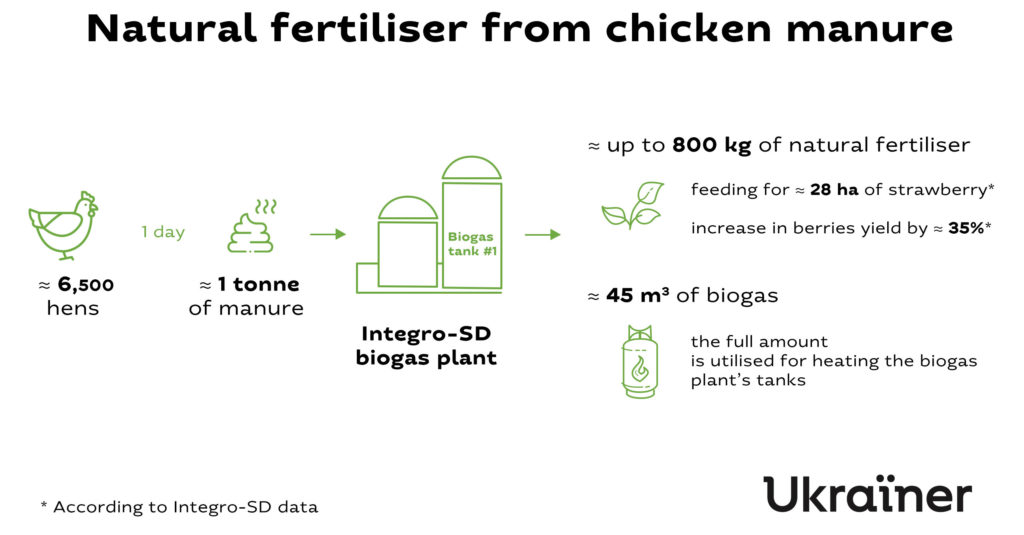
During the manure processing a biogas is formed inside the hydrolyser and the fermenter. Special reservoirs — the gasholders — are connected to those tanks; this is where the biogas can be stored before its further use. From one tonne of manure about 45 cubic metres of biogas can be produced. It is utilised in full for preheating the biogas tank vessels, where all the main processes take place.
Anton Bulyhin claims, such a production is energy effective and does not consume many resources. According to the company’s data, during 2019–2020 their annual consumption levels totalled 205 cubic meters for water and 25,700 kWh for electricity. From the enclosed reactors of the biogas tank no CO2, methane or ammonia (the most volatile gas, which is contained in the chicken manure in large quantities) are emitted into the atmosphere.
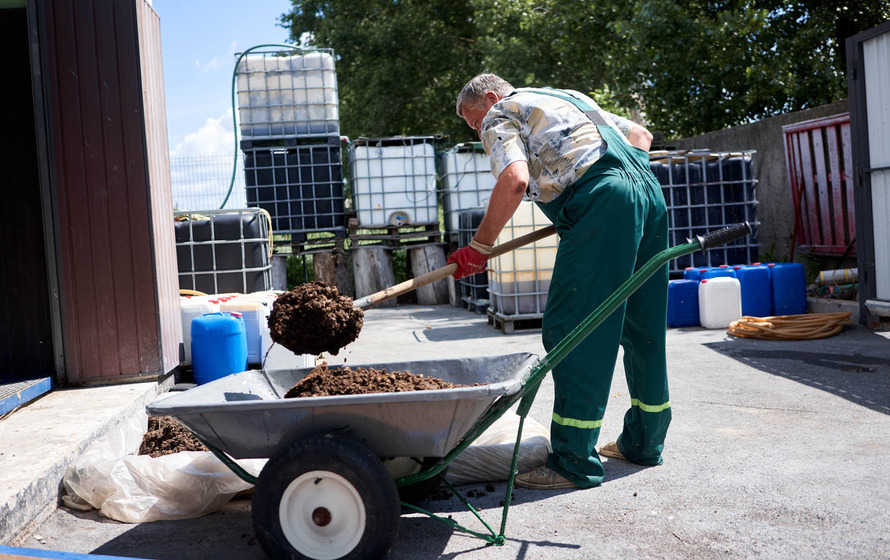
Currently Integro-SD builds tanks with the capacity of 1 and of 20 tonnes. The company had to put the development of the latter one on hold in 2014. The difference between these two tanks is in the amount of manure which they can receive for recycling.
“The main purpose of our team’s work is to improve this technology, to gain better understanding of how it works. Making money is secondary.”
Working with small farmers
Over the years of working in the agricultural sector Integro-SD have defined their main clients: small farms, berry and vegetable clusters. They were looking for customers at trade shows, seminars, over the Internet and social networks, says Anton. But word of mouth still works the best of all, Anton claims: when one farmer, who tried using their fertiliser and liked the results, recommends it to another, and so on.
“We no longer waste our time with large corporations or agroholdings, because they have different business models and needs. We see the small farmer as our main client, our consumer and partner. If you own a small poultry farm, our offering will be relevant to you. If you are a farmer with 1 to 500 ha of berries, vegetables or orchards — you’re also our client.”
“Within five years we have tried our fertilisers with about three dozens of various crops. Those were garden and field crops. As of today we have concentrated on three groups: berry crops, vegetables and orchards. Our products achieved the best results with strawberries, raspberries, tomatoes, cucumbers, cabbage, beetroot, apples, pears and peaches.”
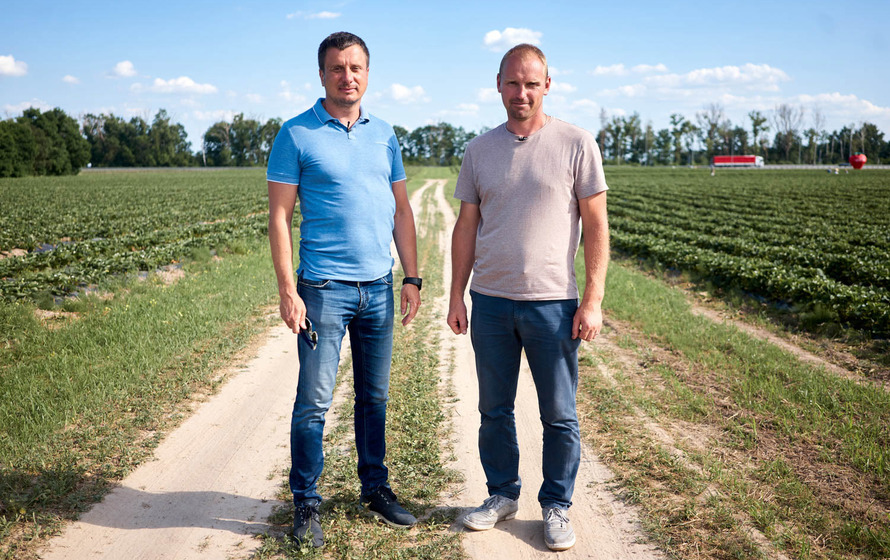
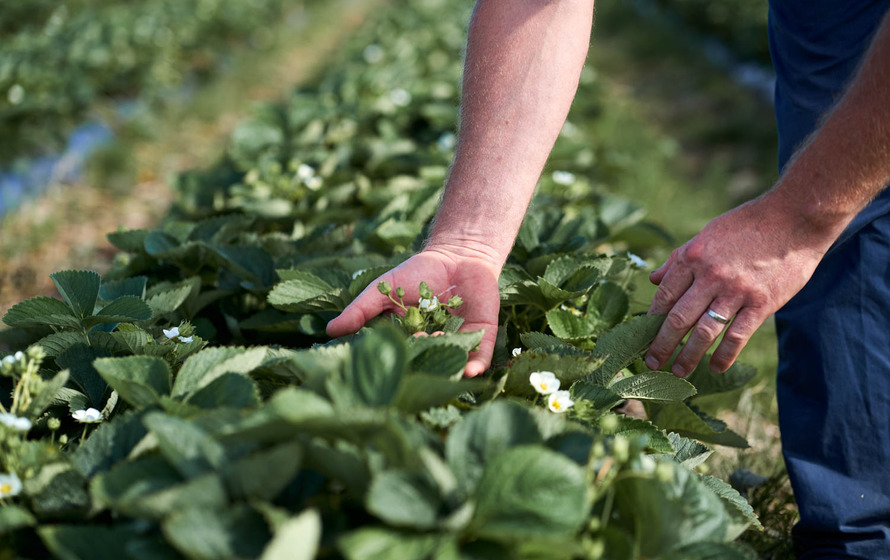
One of the Integro-SD partners, Agrovesna (Agricultural Spring), is a berry cooperative that specialises in growing strawberries, raspberries, and blueberries. Three years in a row they have been using “Gumino de gallina” fertiliser in their fields.
“Even though “Gumino de gallina” is a fertiliser of organic origin, and most practitioners advise against using this type of fertiliser for blueberries, because they may burn the roots, we, nevertheless, have a small demonstration plot, where we tried it. Nothing got burned so far and the blueberries still look good.”
The cooperative’s director Yevhen Pylyponchyk says that in Agrovesna they most often combine organic fertilisers with mineral ones.
“We purposely ran a few experiments, where we applied only traditional feeding systems or “Gumino”, and at the end we concluded that combining them was best of all. So that’s what we do. In our view the best results are achieved through a combination of mineral and natural or organic fertilisers, and that has a favourable effect on the soil structure.”
One of Integro-SD development directions is environmental volunteering. The company works regularly with the SamoSad (from Ukrainian, “self planted” ) team, who restored one of the public gardens in Podil district in Kyiv. For the warm season the project team sets up a small communal vegetable allotment in the garden. Integro-SD supplies them with the fertilisers for soil feeding. Another initiative the company has joined is a project #TreesForBirds from the Pelican charity (Peli can live), whose volunteers preserve ecosystems and plant trees on the routes of migratory birds. And so this summer Integro-SD supplied their fertilisers to feed the deciduous trees in the Pyriatyn national nature park.
“Ecology and all related environmental topics are the main philosophy of our business. We are not living in a bubble. We live in society and so we look up to the others, to what they do in this area.”
Anton Bulyhin adheres to this philosophy not only in his business but in everyday life, as well:
“I like it so much when it’s clean and neat around, this is how I raise my children. This is the bar we set at our home. We have to be ecologically responsible. I also say to my kids that we have to start with ourselves, and set an example to others of what should be done. This is how I raise my children and I ask of them only what I practise myself.”
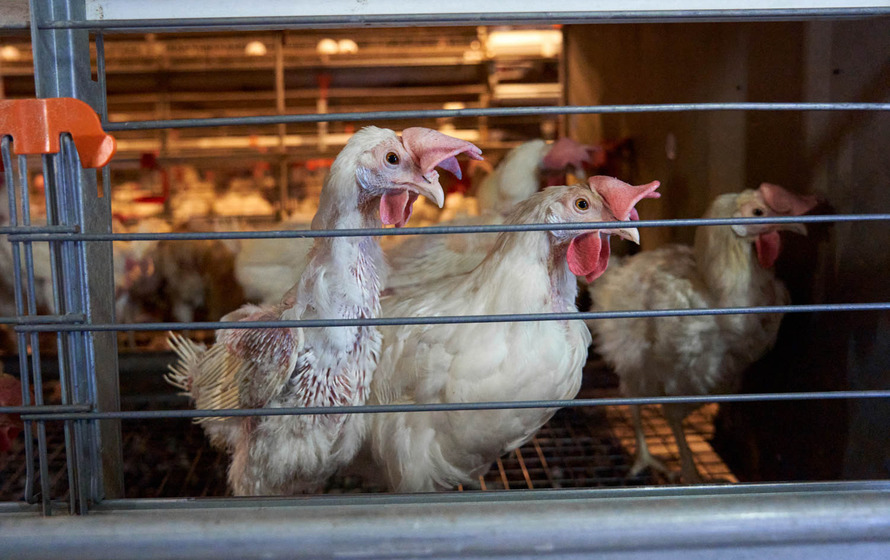
Support and the future plans
In 2019 Integro-SD received a grant as a part of the Climate Innovation Vouchers project, organised by the NGO Greencubator with support from the European Bank for Reconstruction and Development and the European Union. This made manufacturing automation possible: now all the processes in the biogas tank can be controlled remotely via a smartphone, and so the key parameters can be monitored and the data collected.
Also, the company has made its first steps toward the European market. Before the lockdown the company managed to receive the necessary patents and export permits and to agree on cooperation with its partners in Cyprus, Greece and Spain. The COVID-19 pandemic put the cooperation on hold but did not stop it completely — this very Autumn the first supply of the fertilisers was delivered to Cyprus. Anton’s current dream is to build one of the plants with European partners and to live in Europe for a while, for a knowledge exchange. Anton says that entering the global market is Integro-SD’s major plan, because the demand for such technology in Ukraine is not that high:
“I received many calls with requests: ‘You are doing such a great job! And I have a small farm (or a field) and I’d like to get a biogas plant too’. But when they hear how much it costs, they realise they don’t have enough of their own money and won’t be able to get a loan (due to high interest rates), and they realise that there is no solution to this problem.”
Integro-SD also plan to build their own small organic poultry farm, which could supply enough raw material for the biogas plant.
“We don’t have those papers yet, which would confirm that “Gumino de gallina” is an organic fertiliser. Acquiring it is our main objective for now. We want to receive that certificate. But there is an issue. For us to get it all the components of our fertiliser have to be organic. We need to take pure chicken manure with the organic certificate of its own, and we could not find one in Ukraine so far. That’s why we want to build a small organic poultry farm, which will allow us to receive the certificate and will make all “organic” farmers in Ukraine happy.”
Building such a farm will allow the company to get the Organic Services certificate which will certify the fertiliser’s quality. Anton believes, as soon as this happens, the company won’t have to look for the clients anymore — they themselves will strive to receive their product.
“Despite the fact that the organic market in Ukraine is not very well developed, the trend is positive and more and more new farmers switch to this organic class every year. There is this new generation who wants to consume organic and clean produce. But as it happens, the offering of fertilisers for organic farmers today is very limited. And as soon as they learn about what we do, they realise that our product meets their criteria.”
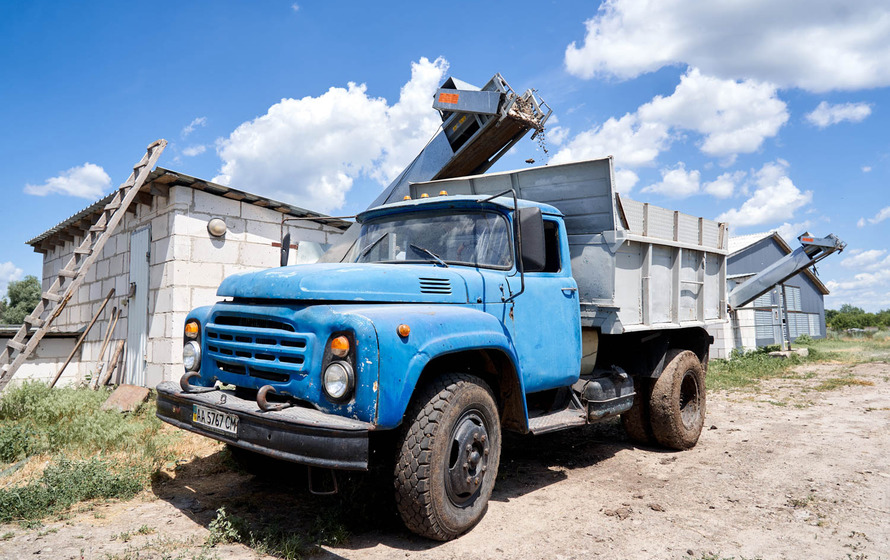
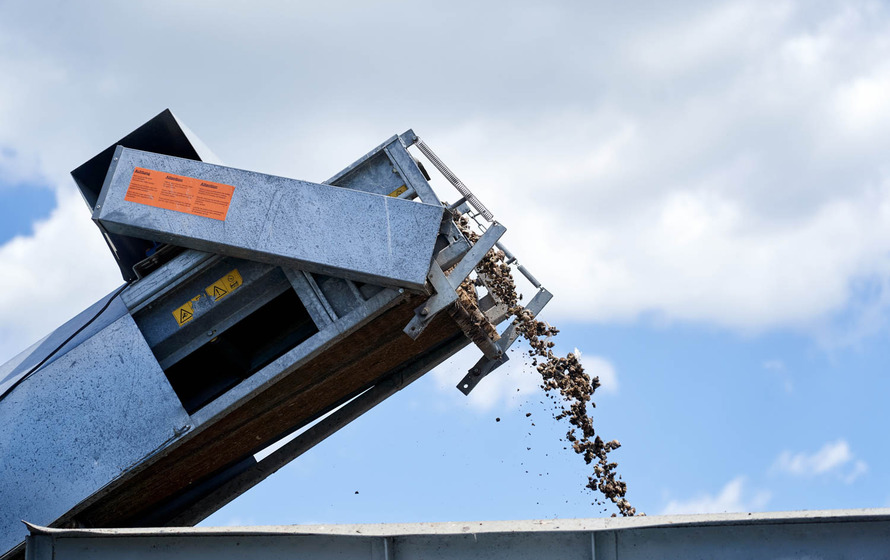
In Ukraine today, according to Anton Bulyhin, there are many opportunities to do business, and especially in the agricultural sector. As for natural fertiliser production, the area Integro-SD operates in, this niche is still free and open to development.
“It is indeed hard to do business in Ukraine. First of all, because there’s no confidence in the future. This is awful, especially when you have a family, children, and you realise you are responsible for them. You have to leave them something. But if you look at all this as a game, as a part of your life, which should be interesting and unpredictable, and where tomorrow you may win a jackpot — this is very interesting. This is what attracts me.”
SUPPORTED BY
Supported by Greencubator and Climate Innovation Vouchers projects, financed by European Bank for Reconstruction and Development, and European Union

Source: Ukraїner
Turning chicken manure into fertiliser and a source of energy


